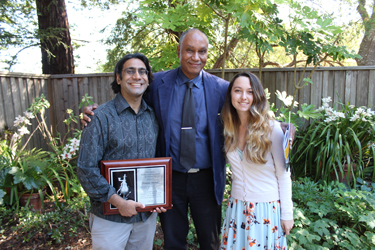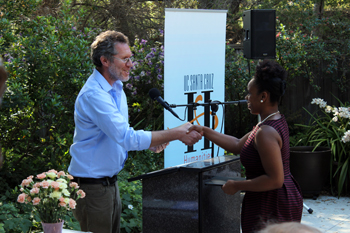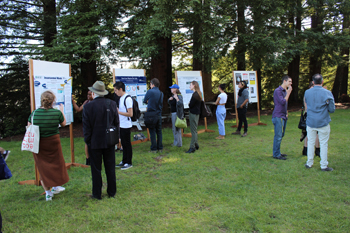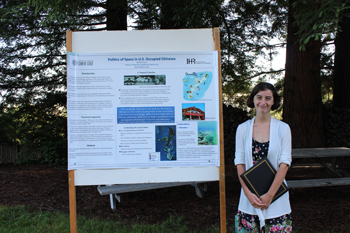Campus News
Linguistics professor Pranav Anand receives Dizikes Award for teaching in Humanities
Associate professor of linguistics Pranav Anand was presented with the John Dizikes Teaching Award in Humanities at the Humanities Division’s 2016 Spring Awards celebration held at the Cowell Provost House.






Established in 2002 to honor outstanding teaching by humanities faculty, the annual award is named in honor of emeritus professor John Dizikes, one of UC Santa Cruz’s founding faculty members. It is designed to celebrate the Humanities faculty’s commitment to excellence in teaching and its impact on undergraduate students.
The award comes with an unusual provision. In addition to being honored with a check for $3,000, the faculty winner is also entitled to select an undergraduate student to receive a $3,000 scholarship. Anand chose Dhyana Buckley, a senior linguistics major with a passion for theater arts, who hopes to pursue a career of research in computational linguistics.
Annand noted that after years of teaching, he has learned to take students as they are, and to view them each as individuals.
“In teaching, I have had to reckon with the indirectness of my causal efficacy,” said Anand. “In the ideal case, when all things are humming and I have read minds aright, I afford learning by clearing the room of hazards. Indeed, perhaps my teaching philosophy is simply this: to work stridently to render myself invisible, to disappear in plain sight, leaving only blazes to mark the trail ahead.”
Student scholarship recipient Buckley added that she appreciated how her linguistics classes promote individual critical thinking and problem solving without explicitly instructing students on how to complete the task at hand.
“The sense of accomplishment that I have felt after solving a problem successfully is the highest return,” she noted. “This ability to think independently is one of the many skills I am grateful to have learned at UC Santa Cruz.”
Chancellor George Blumenthal addressed the audience prior to the presentation of the awards.
“I marvel that there still seems to be a question in the minds of some about the value today of a humanities education,” said Blumenthal. “Let me be blunt: I think it is more valuable—and more needed—than ever.”
“I came across a quote from environmental attorney and author Gus Speth that sums up my feelings,” he added. “This guy has credentials–he is the founder of the Natural Resources Defense Council, was an environmental adviser to Presidents Carter and Clinton, and is a professor at Vermont Law School and the author of several books. And here is what he said:
“‘I used to think the top environmental problems were biodiversity loss, ecosystem collapse, and climate change. I thought that with 30 years of good science we could address those problems. But I was wrong. The top environmental problems are selfishness, greed, and apathy. And to deal with those, we need a spiritual and cultural transformation—and we scientists don’t know how to do that.’”
“Truly, it’s going to take all of us to get ourselves out of the pickle we’ve gotten into,” the chancellor concluded. “There’s a major role for humanists. Don’t let anyone tell you otherwise!”